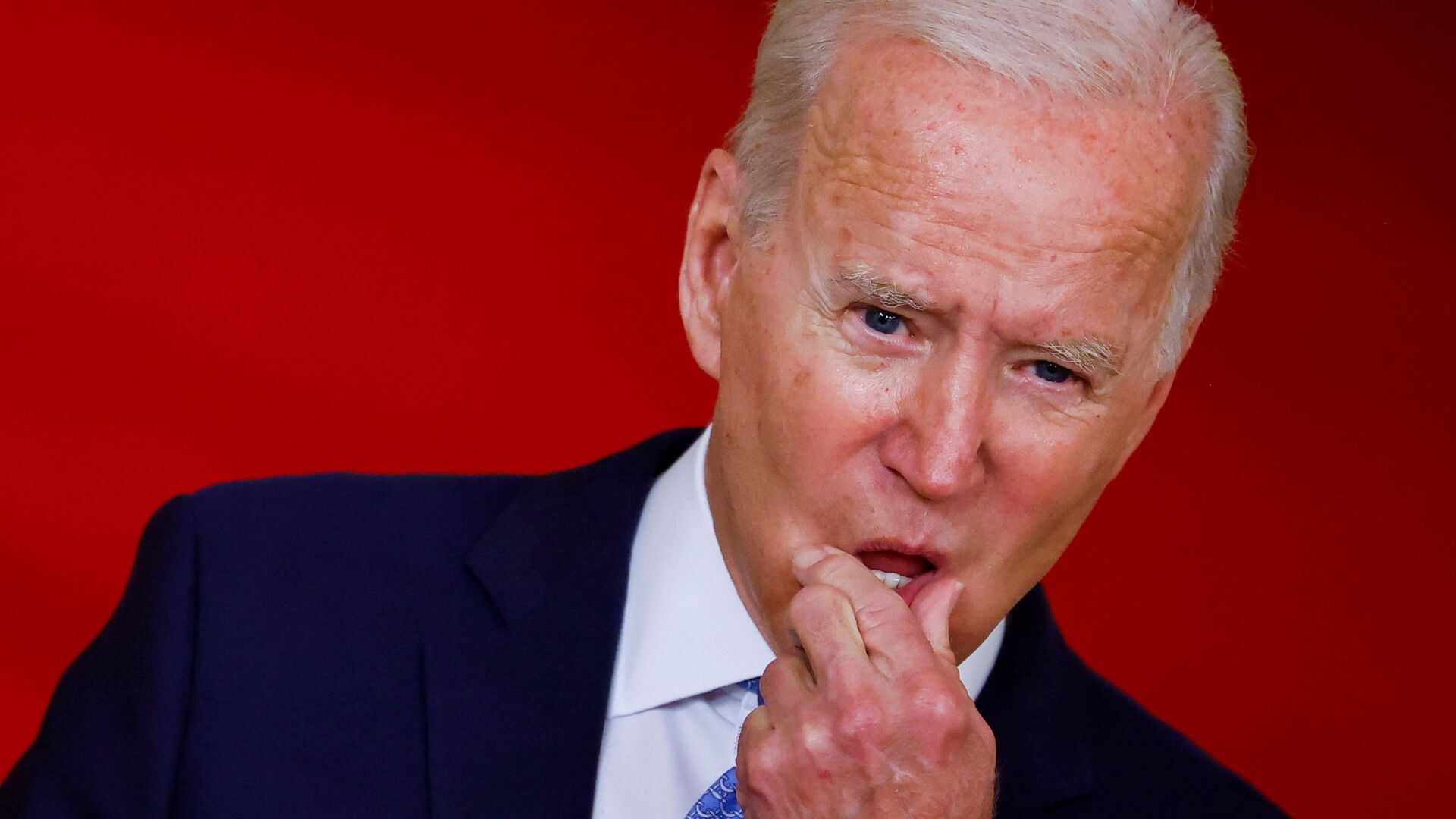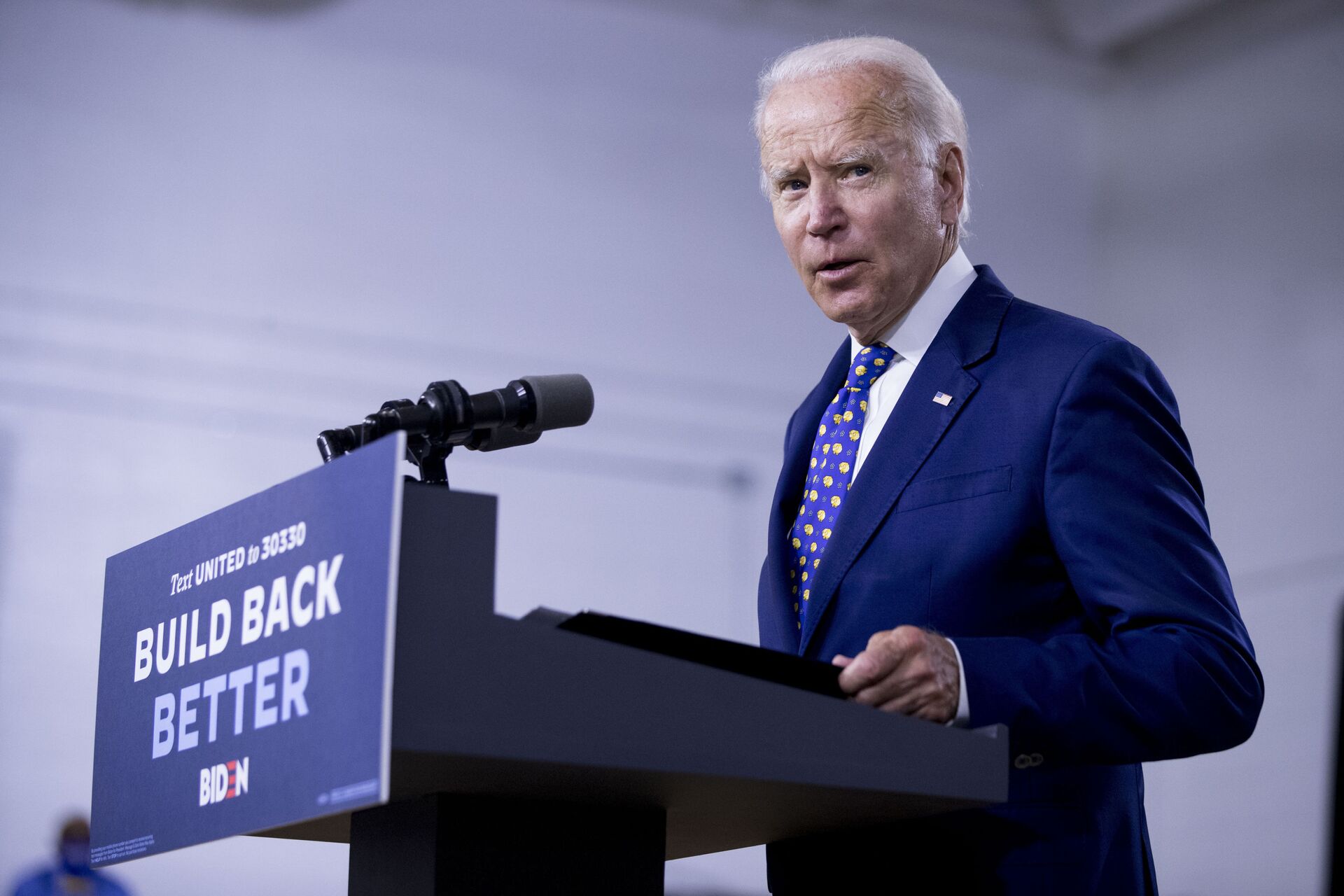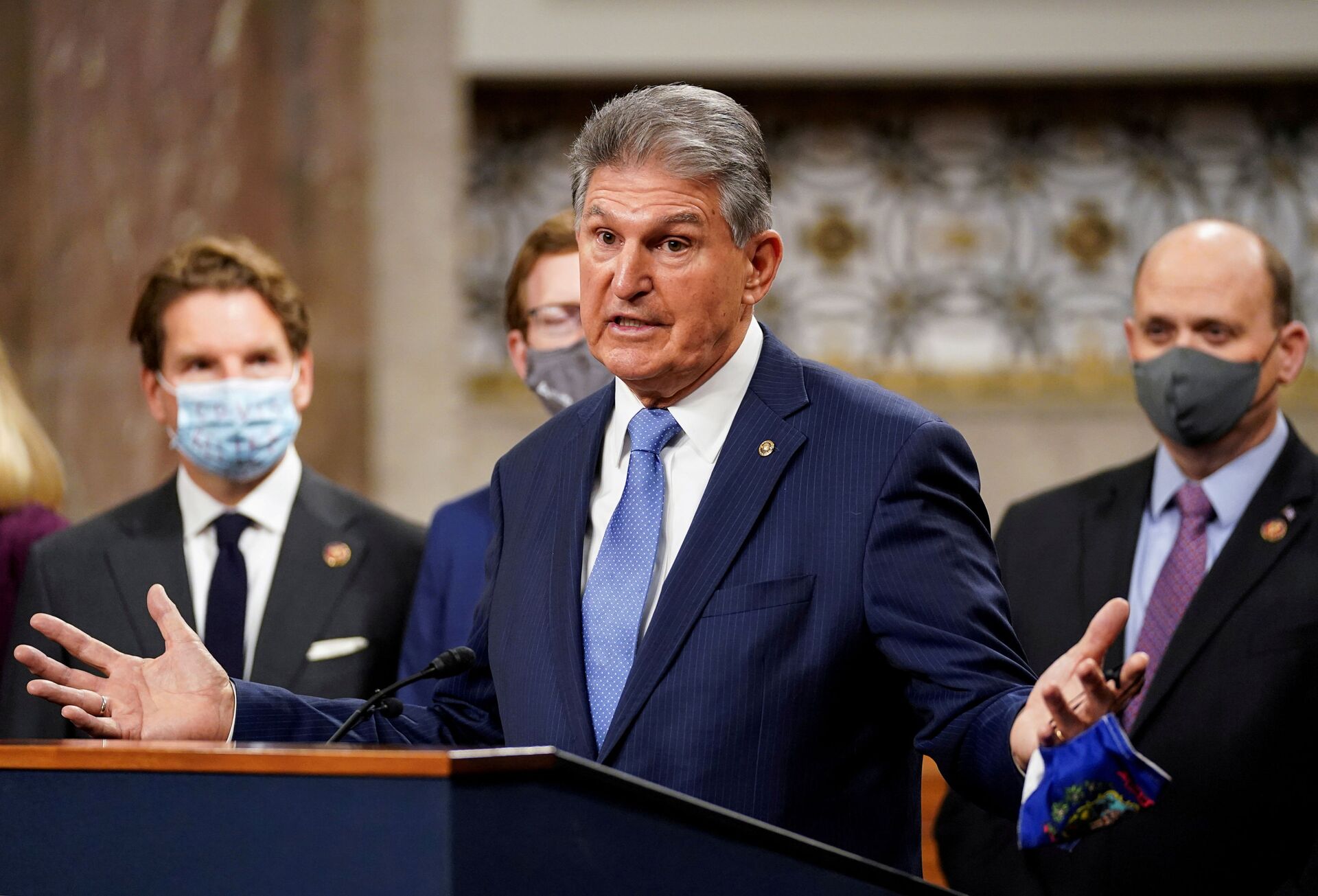https://sputnikglobe.com/20211007/progressives-vs-centrists-why-biden-cant-unite-even-his-own-party--why-it-may-end-badly-for-dems-1089747795.html
Progressives vs Centrists: Why Biden Can't Unite Even His Own Party & Why it May End Badly for Dems
Progressives vs Centrists: Why Biden Can't Unite Even His Own Party & Why it May End Badly for Dems
Sputnik International
Joe Biden, who ran his presidential campaign promising to unify the nation, has not only riled the GOP but is also now facing a growing discord in his own... 07.10.2021, Sputnik International
2021-10-07T18:40+0000
2021-10-07T18:40+0000
2021-10-08T14:52+0000
joe biden
infrastructure
newsfeed
world
us
opinion
sen. joe manchin (d-west virginia)
spending
us economy
progressives
https://cdn1.img.sputnikglobe.com/img/07e5/09/01/1083771566_0:251:2753:1799_1920x0_80_0_0_7e84fce847c60fb135c414ecd159c30d.jpg
Biden has become "frustrated" with moderate Democratic Senators Joe Manchin of West Virginia and Kyrsten Sinema of Arizona, who have pushed the pause button on the president's milestone $3.5 trillion social infrastructure bill, which envisages combating climate change and expanding the child tax credit and Medicare's coverage, among other issues, according to Politico.Manchin and Sinema earlier signalled that they would not support a bill that costs $3.5 trillion. The Western Virginia senator further proposed to slash the price tag by more than a half:Given the GOP's unanimous resistance to the bill, Senate Dems cannot neglect Manchin and Sinema's votes in the evenly split upper chamber.The demarche of two centrist Democrats prompted ire in the party's progressive camp that flatly refused on 3 October to shrink Biden's social package. To obtain leverage to secure passage of Biden's $3.5 trillion bill, on 28 September, the nearly 100-member Congressional progressive caucus blocked a House vote on the bipartisan $1 trillion package approved by Democratic centrists. The progressives resolutely rejected House Speaker Nancy Pelosi's decision to push the bill forward, exposing a deepening rift in the Democratic ranks. According to The New York Times, the growing mistrust within the party "is threatening to derail President Biden’s domestic policy agenda."Why Biden is 'Leaning' Towards Progressives"The Democrats span a large ideological range, and uniting them around a single bill is very difficult," says Ken Kollman, a political science professor at the University of Michigan.Instead of becoming a "unifier," Biden has little choice but to lend a sympathetic ear to progressives given that he "owes his election to left-leaning constituents and their record turnout," according to the professor.Furthermore, Biden's social spending package is primarily filled with the priorities which he peddled when he sought the presidency, notes Kevin Wagner, a political science professor at Florida Atlantic University. For their part, progressives appear to have settled on supporting the agenda that President Biden proposed when running, although they would probably like a larger bill that includes more progressive policies, according to him. So, it's hardly surprising that proposed cuts to Biden's package have sparked criticism from Pramila Jayapal (D-WA), the current chair of the progressive caucus in the House.Apparently therefore, Biden is not rushing to slash his bill – he has "kind of over-promised not just to the progressive elected officials, but to a whole bunch of interest groups that are going to benefit from this bill," according to Palazzolo. "They’ve been wanting to do this for a long time," he notes. "That's where the disappointment is."The Moderate MinorityWhile the progressives constitute a considerable part of the Democratic Party, the moderates opposing the $3.5 trillion bill, including Manchin and Sinema, appear to be in the minority. These centrists have recently been subjected to harsh criticism in the press by left-leaning observers. "A small number of Democrats in Washington… should not seek to dominate the president and most Democrats in Congress and nationally! Not now. Not ever," argued US writer Brent Budowsky in his 5 October op-ed for the Hill."If we should respect Manchin and Sinema, they should respect the rest of us," the writer insisted. "We are, in fact, the overwhelming majority of Democrats and the majority of Americans who, in poll after poll, back most major elements of the Build Back Better programme."Concurrently, progressive Democrats are urging their party fellows to stop using the term "moderate" to describe those Dems who hinder Biden's multi-trillion dollar bill in the US Congress. Some Democratic congressmen argue that this term "unfairly maligns [their] colleagues who are actually moderate yet by and large understand the stakes of this historic moment."Meanwhile, the clock is ticking on Biden's "Build Back Better" project, the observers note. As the president's approval ratings are plummeting in the aftermath of the Afghan chaotic pull-out, soaring inflation and uncertainty related to the COVID pandemic, he "very much needs something to pass," Kollman says.Progressives Hurt Dems' Election ChancesThe Democrat Party is badly split, as is the Republican Party today, according to Alan Dershowitz, Harvard Law professor emeritus, lawyer and a longtime Democrat. He assumes that in the end, the Democrats "will have to compromise" and reach a consensus on the Biden infrastructure bill. However, their problem is deeper than just one piece of legislation, the lawyer believes.The professor underscores that "America is a centrist country" and "the reason Biden was elected president is because he was perceived to be a moderate in the centre." By allowing the radical leftists to dominate the party in many ways, the Democrats risk being perceived as "extremists on the left," which will significantly diminish their election odds, according to the lawyer. On the other hand, progressives are pushing moderate Democrats into the GOP embrace, especially if the Republicans become more moderate on issues like abortion and gun control and gay marriage, he believes."These people are not progressives," Dershowitz highlights. "They are regressives. They don't believe in free speech. They don't believe in due process. They don't believe in the American way. And they don't believe in basic decency. And so, yes, there's going to be a real problem."
Sputnik International
feedback@sputniknews.com
+74956456601
MIA „Rosiya Segodnya“
2021
News
en_EN
Sputnik International
feedback@sputniknews.com
+74956456601
MIA „Rosiya Segodnya“
Sputnik International
feedback@sputniknews.com
+74956456601
MIA „Rosiya Segodnya“
joe biden, infrastructure, newsfeed, us, opinion, sen. joe manchin (d-west virginia), spending, us economy, progressives, us democratic party, us midterm elections, 2024 us presidential election
joe biden, infrastructure, newsfeed, us, opinion, sen. joe manchin (d-west virginia), spending, us economy, progressives, us democratic party, us midterm elections, 2024 us presidential election
Progressives vs Centrists: Why Biden Can't Unite Even His Own Party & Why it May End Badly for Dems
18:40 GMT 07.10.2021 (Updated: 14:52 GMT 08.10.2021) Joe Biden, who ran his presidential campaign promising to unify the nation, has not only riled the GOP but is also now facing a growing discord in his own party. American academics have explained what risks the latest strife between Democratic progressive and moderate wings is fraught with.
Biden has become "frustrated" with moderate Democratic Senators Joe Manchin of West Virginia and Kyrsten Sinema of Arizona, who have pushed the pause button on the president's milestone $3.5 trillion social infrastructure bill, which envisages combating climate change and expanding the child tax credit and Medicare's coverage, among other issues,
according to Politico.
Manchin and Sinema earlier signalled that they
would not support a bill that costs $3.5 trillion. The Western Virginia senator further proposed to slash the price tag by more than a half:
"I've never been a liberal in any way, shape, or form," Manchin said last Thursday. "I'm willing to come from zero to $1.5 [trillion]."
Given the GOP's unanimous resistance to the bill, Senate Dems cannot neglect Manchin and Sinema's votes in the evenly split upper chamber.
The demarche of two centrist Democrats prompted ire in the party's progressive camp that flatly refused on 3 October to shrink Biden's social package.
"That’s not going to happen," said Democratic Representative Pramila Jayapal from Washington. "It’s going to be somewhere between $1.5 and $3.5, and I think the White House is working on that right now. Remember: What we want to deliver is child care, paid leave, and climate change."
To obtain leverage to secure passage of Biden's $3.5 trillion bill, on 28 September, the nearly 100-member Congressional progressive caucus blocked a House vote on the bipartisan $1 trillion package approved by Democratic centrists.
The progressives resolutely rejected House Speaker Nancy Pelosi's decision to push the bill forward, exposing a deepening rift in the Democratic ranks.
According to The New York Times, the growing mistrust within the party "is threatening to derail President Biden’s domestic policy agenda."
Why Biden is 'Leaning' Towards Progressives
"The Democrats span a large ideological range, and uniting them around a single bill is very difficult," says Ken Kollman, a political science professor at the University of Michigan.
Instead of becoming a "unifier," Biden has little choice but to lend a sympathetic ear to progressives given that he "owes his election to left-leaning constituents and their record turnout," according to the professor.
Furthermore, Biden's social spending package is primarily filled with the priorities which he peddled when he sought the presidency, notes Kevin Wagner, a political science professor at Florida Atlantic University. For their part, progressives appear to have settled on supporting the agenda that President Biden proposed when running, although they would probably like a larger bill that includes more progressive policies, according to him. So, it's hardly surprising that proposed cuts to Biden's package have sparked criticism from Pramila Jayapal (D-WA), the current chair of the progressive caucus in the House.
"[Biden] raised those expectations on the progressive side," says Professor Daniel Palazzolo, Chairman of the Political Science Department at the University of Richmond. "And now that's where the strength of the party is. So he's trying to keep them in a ‘tent’, trying to keep them together, because he needs them."
Apparently therefore, Biden is not rushing to slash his bill – he has "kind of over-promised not just to the progressive elected officials, but to a whole bunch of interest groups that are going to benefit from this bill," according to Palazzolo. "They’ve been wanting to do this for a long time," he notes. "That's where the disappointment is."
While the progressives constitute a considerable part of the Democratic Party, the moderates opposing the $3.5 trillion bill, including Manchin and Sinema, appear to be in the minority. These centrists have recently been subjected to harsh criticism in the press by left-leaning observers. "A small number of Democrats in Washington… should not seek to dominate the president and most Democrats in Congress and nationally! Not now. Not ever," argued US writer Brent Budowsky in his 5 October
op-ed for the Hill.
"If we should respect Manchin and Sinema, they should respect the rest of us," the writer insisted. "We are, in fact, the overwhelming majority of Democrats and the majority of Americans who, in poll after poll, back most major elements of the Build Back Better programme."
Concurrently, progressive Democrats are urging their party fellows to stop using the term "moderate" to describe those Dems who hinder Biden's multi-trillion dollar bill in the US Congress. Some Democratic congressmen
argue that this term "unfairly maligns [their] colleagues who are actually moderate yet by and large understand the stakes of this historic moment."
Meanwhile, the clock is ticking on Biden's "Build Back Better" project, the observers note. As the president's approval ratings are plummeting in the aftermath of the Afghan chaotic pull-out, soaring inflation and
uncertainty related to the COVID pandemic, he "very much needs something to pass," Kollman says.
"The biggest risk isn't the policies, which appear to be pretty popular in national polling," Kevin Wagner notes. "The bigger risk is failing to pass the agenda which would make the president seem ineffective."
Progressives Hurt Dems' Election Chances
The Democrat Party is badly split, as is the Republican Party today, according to Alan Dershowitz, Harvard Law professor emeritus, lawyer and a longtime Democrat. He assumes that in the end, the Democrats "will have to compromise" and reach a consensus on the Biden infrastructure bill. However, their problem is deeper than just one piece of legislation, the lawyer believes.
"There's a complete lack of trust by centrist Democrats of the radicals because the radicals don't care about what's good for America," Dershowitz says. "They don't care about what's good for world peace. They care about only serving their own agenda. And so yes, the centre of the Democratic Party doesn't trust the radicals, and the radicals don't trust anybody. So it's a major problem, and it will mean the defeat of the Democratic Party in the next election and perhaps in the next presidential election as well."
The professor underscores that "America is a centrist country" and "the reason Biden was elected president is because he was perceived to be a moderate in the centre." By allowing the radical leftists to dominate the party in many ways, the Democrats risk being perceived as "extremists on the left," which will significantly diminish their election odds, according to the lawyer. On the other hand, progressives are pushing moderate Democrats into the GOP embrace, especially if the Republicans become more moderate on issues like abortion and gun control and gay marriage, he believes.
"These people are not progressives," Dershowitz highlights. "They are regressives. They don't believe in free speech. They don't believe in due process. They don't believe in the American way. And they don't believe in basic decency. And so, yes, there's going to be a real problem."







